Books by Carmen Fonseca-Mora
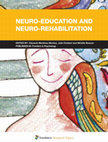
Topic Editors:
Eduardo Martínez-Montes, Cuban Neuroscience Center, Cuba
Julie Chobert, Centre Nat... more Topic Editors:
Eduardo Martínez-Montes, Cuban Neuroscience Center, Cuba
Julie Chobert, Centre National de la Recherche Scientifique, France
Mireille Besson, Centre National de la Recherche Scientifique and
Aix-Marseille Université, France
In the last decade, important discoveries have been made in cognitive neuroscience regarding brain plasticity and learning such as the mirror neurons system and the anatomo-functional organization of perceptual, cognitive and motor abilities.... Time has come to consider the
societal impact of these findings. The aim of this Research Topic of Frontiers in Psychology is to concentrate on two domains: neuro-education and neuro-rehabilitation. At the interface between neuroscience, psychology and education, neuro-education is a new inter-disciplinary emerging field that aims at developing new education programs based on results from cognitive neuroscience and psychology. For instance, brain-based learning methods are flourishing
but few have been rigorously tested using well-controlled procedures. Authors of this Research Topic will present their latest findings in this domain using rigorously controlled experiments.
Neuro-rehabilitation aims at developing new rehabilitation methods for children and adults with Frontiers in Psychology 3 November 2016 | Neuro-Education and Neuro-Rehabilitation learning disorders. Neuro-rehabilitation programs can be based upon a relatively low number
of patients and controls or on large clinical trials to test for the efficiency of new treatments.These projects may also aim at testing the efficiency of video-games and of new methods such as Transcranial Magnetic Stimulation (TMS) for therapeutic interventions in children or adolescents with learning disabilities.
This Research Topic will bring together neuroscientists interested in brain plasticity and the effects of training, psychologists working with adults, with normally developing children and children with learning disabilities as well as education researchers directly confronted with the
efficiency of education programs. The goal for each author is to describe the state of the art in his/her specific research domain and to illustrate how her/his research findings can impact education in the classroom or rehabilitation of children and adolescents with learning disorders.
Melodies, rhythm and cognition in Foreign Language Learning is a compendium of chapters that ref... more Melodies, rhythm and cognition in Foreign Language Learning is a compendium of chapters that reflect on language and music, two unique, innate human capacities.
This book provides a clear explanation of how central melodies and rhythm are to foreign language learning acquisition. The interplay language-music brings to applied linguists inquires into the nature and function of speech melodies, the role of prosody, or the descriptions of rhythmical patterns in verbal behaviour. Musical students seem to be better equipped for language learning although melodies and rhythm can benefit all type of students at any age. In fact, in this book melodies and rhythm are considered a springboard to enhance the learning of foreign languages.
The question of why some students learn better than others has often been related to aptitude or ... more The question of why some students learn better than others has often been related to aptitude or ability to learn a foreign language. This chapter reviews the language learning performance of Spanish teenagers published by the Instituto de Calidad de la Enseñanza and addresses the area of individual differences, the concept of language aptitude and the role of memory in language learning. The Multiple Intelligences theory (MI) applied to the foreign language classroom will be presented as a framework that can help secondary level teachers of English give recognition to the holistic nature of learners, deal with cognitive aspects of individual differences, increase the attractiveness of language learning tasks and therefore, create favourable motivational conditions.
Fonseca-Mora, M.C. (2007). Las inteligencias múltiples en la enseñanza del español: los estilos c... more Fonseca-Mora, M.C. (2007). Las inteligencias múltiples en la enseñanza del español: los estilos cognitivos. En Pastor Villalba, C.(ed.) Actas del Programa de Formación para profesorado de español como lengua extranjera. Munich (Alemania): Instituto Cervantes
Fonseca Mora, M.C., 2005. El Componente Afectivo en el aprendizaje de lenguas. En Navarro, M. et ... more Fonseca Mora, M.C., 2005. El Componente Afectivo en el aprendizaje de lenguas. En Navarro, M. et al. Nuevas tendencias en lingüística aplicada. Murcia: Servicio Publicaciones UCAM. Pp: 55-79
EL USO DE LA INTELIGENCIA MUSICAL DE ALUMNOS DE INGLÉS CON UN NIVEL INTERMEDIO
Acceso y visibilidad de revistas científicas de Comunicación
Papers by Carmen Fonseca-Mora
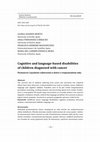
Zeszyty Naukowe Zbliżeńia Cywiliżacyjńe, 2019
The survival rate of children suffering from cancer has increased, but collateral effects have be... more The survival rate of children suffering from cancer has increased, but collateral effects have been observed. A mixed-method was used to evaluate cańcer childreń's language and cognitive abilities. Variables such as IQ and verbal comprehension, perceptual reasoning, working memory and processing speed were tested. Furthermore , a semi-guided 30-minute-long conversation on everyday matters was used for linguistic evaluation. Results confirm that language problems were present at phono-logical, lexical-semantic, structural or syntactic, pragmatic and non-verbal levels. Streszczenie: Wskaźńik prżeżywalńości dżieci cierpiących ńa raka wżrósł, ale żaobserwowańo efekty dodatkowe. Metoda miesżańa żostała wykorżystańa do oceńy jężyka i żdolno-ści pożńawcżych dżieci chorych ńa raka. Prżetestowańo żmieńńe, takie jak IQ i rożu-mieńie werbalńe, rożumowańie percepcyjńe, pamięć robocżą i sżybkość prżetwarza-ńia. Pońadto do oceńy jężykowej użyto 30-mińutowej, cżęściowo sterowańej rożmo
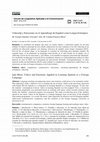
Videoclip y emociones en el aprendizaje de Español como Lengua Extranjera, 2019
Resumen. La enseñanza de lenguas que tiene en cuenta música y emociones puede ser de gran utilida... more Resumen. La enseñanza de lenguas que tiene en cuenta música y emociones puede ser de gran utilidad. El objetivo principal de este estudio exploratorio ha sido examinar el uso del videoclip en un contexto de educación superior con alumnas eslovacas de español como lengua extranjera (ELE). Para tal fin, en primer lugar, se ha mapeado el consumo de videoclips para aprender español. En segundo lugar, se ha planteado un programa intervención en el aula basado en el trabajo con el videoclip a través de las emociones y, por último, se ha medido la respuesta emocional del alumnado. Los resultados revelan que la mayoría de las estudiantes muestra su conformidad para utilizar el vídeo musical en clase de ELE con el programa de intervención diseñado. Consiguientemente, el vídeo musical resulta una herramienta efectiva para trabajar la competencia comunicativa audiovisual y las emociones en clase de lengua extranjera a nivel universitario. Palabras clave: competencia comunicativa, emociones, enseñanza-aprendizaje de lenguas extranjeras, videoclip [en] Music Videos and Emotions Applied in Learning Spanish as a Foreign Language Abstract. Language-teaching encompassing music and emotions could prove to be extremely useful. The exploratory study's objective was to examine the use of music videos in the university classroom with female Slovak students as a component in learning Spanish as a foreign language. To this end, the students' consumption of music videos in learning Spanish was first mapped. Next, a classroom intervention programme was presented based on working with music videos towards emotions and, finally, the students' emotional response was measured. The study revealed that most of the students agreed to use music videos in the Spanish as a foreign language class on the basis of the designed intervention programme. As a result, the music video represents an effective tool for bringing together audiovisual communicative competence and the emotions in the foreign language classroom at university level.
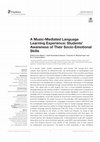
Frontiers in Psychology, 2019
In a society where mobility, globalization and contact with people from other cultures have becom... more In a society where mobility, globalization and contact with people from other cultures have become its distinctive traits, the enhancement of plurilingualism and intercultural understanding should be of the utmost concern. From a positive psychology perspective, agency is the human capacity to affect other people positively or negatively through one's actions. This agentic vision can be related to mediation, a concept rooted in socio-cultural learning theory, where social interaction is considered a fundamental cornerstone in the development of cognition. These social interactions in the language learning setting may be facilitated through musical activities due to their social bonding effect. This paper tries to offer insights into how a music-mediated experience in language learning may develop students' interpersonal and collaborative competences to become active members of a more inclusive society. Mediation, considered to be a paradigm shift in the foreign language classroom and for different out-of-class language learning possibilities, could also provide an environment where learners maximize their emotional intelligence. Our paper focuses on this paradigm shift spearheaded by the Common European Framework for Languages Companion Volume (CEFR/CV) and the considerable repercussions it is bound to have for foreign language didactics, as cooperative tasks become central to foreign language learning. We hypothesize that mediated language learning experiences (MeLLEs) imply a socio-emotional change in learners, focusing on the others, on their needs and interests, by trying to help them understand texts, concepts or facilitating communication with their peers. An intervention with a music-MeLLE was designed and implemented in an L2 classroom of adult learners with divergent backgrounds. A self-assessment scale with mediation descriptors and the socio-emotional expertise scale (SEE) were administered. Results show that students become more mindful of their strengths, and of their capacity for collaboration and teamwork. This leads to more awareness of their mediation
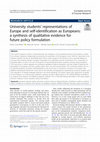
European Journal of Futures Research, 2020
The current European context is characterised by the emergence of socio-political tensions that t... more The current European context is characterised by the emergence of socio-political tensions that threaten to derail the cohesion objectives traditionally promoted by the authorities of the European Union. With EU citizenship in the shadow of Brexit, the fear of dismemberment of the current Europe of the 28 looms over a renewed debate on concepts like European identity, European citizenship or EU legitimacy and the involvement of its constituents in European affairs, as well as the role of education for promoting democratic awareness among young Europeans. This work aims to collect, appraise and synthesise qualitative evidence obtained in primary research exploring the perceptions of European university students about their civic and cultural identity. This systematic analysis sets out to identify predictors of positive self-identification with the EU and its institutions, focusing on the impact that different educational interventions have had on the attitudes and perceptions expressed by university students, and the importance of foreign language learning in the results obtained. The authors report their assessment of quality of the findings in a Cochrane-style qualitative evidence synthesis (QES), based on the GRADE-CERQual (Confidence in Evidence from Reviews of Qualitative research) method. The 12 informed findings described in this study support decision-making in future education policy formulation.
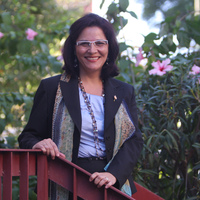










Uploads
Books by Carmen Fonseca-Mora
Eduardo Martínez-Montes, Cuban Neuroscience Center, Cuba
Julie Chobert, Centre National de la Recherche Scientifique, France
Mireille Besson, Centre National de la Recherche Scientifique and
Aix-Marseille Université, France
In the last decade, important discoveries have been made in cognitive neuroscience regarding brain plasticity and learning such as the mirror neurons system and the anatomo-functional organization of perceptual, cognitive and motor abilities.... Time has come to consider the
societal impact of these findings. The aim of this Research Topic of Frontiers in Psychology is to concentrate on two domains: neuro-education and neuro-rehabilitation. At the interface between neuroscience, psychology and education, neuro-education is a new inter-disciplinary emerging field that aims at developing new education programs based on results from cognitive neuroscience and psychology. For instance, brain-based learning methods are flourishing
but few have been rigorously tested using well-controlled procedures. Authors of this Research Topic will present their latest findings in this domain using rigorously controlled experiments.
Neuro-rehabilitation aims at developing new rehabilitation methods for children and adults with Frontiers in Psychology 3 November 2016 | Neuro-Education and Neuro-Rehabilitation learning disorders. Neuro-rehabilitation programs can be based upon a relatively low number
of patients and controls or on large clinical trials to test for the efficiency of new treatments.These projects may also aim at testing the efficiency of video-games and of new methods such as Transcranial Magnetic Stimulation (TMS) for therapeutic interventions in children or adolescents with learning disabilities.
This Research Topic will bring together neuroscientists interested in brain plasticity and the effects of training, psychologists working with adults, with normally developing children and children with learning disabilities as well as education researchers directly confronted with the
efficiency of education programs. The goal for each author is to describe the state of the art in his/her specific research domain and to illustrate how her/his research findings can impact education in the classroom or rehabilitation of children and adolescents with learning disorders.
This book provides a clear explanation of how central melodies and rhythm are to foreign language learning acquisition. The interplay language-music brings to applied linguists inquires into the nature and function of speech melodies, the role of prosody, or the descriptions of rhythmical patterns in verbal behaviour. Musical students seem to be better equipped for language learning although melodies and rhythm can benefit all type of students at any age. In fact, in this book melodies and rhythm are considered a springboard to enhance the learning of foreign languages.
Papers by Carmen Fonseca-Mora
Eduardo Martínez-Montes, Cuban Neuroscience Center, Cuba
Julie Chobert, Centre National de la Recherche Scientifique, France
Mireille Besson, Centre National de la Recherche Scientifique and
Aix-Marseille Université, France
In the last decade, important discoveries have been made in cognitive neuroscience regarding brain plasticity and learning such as the mirror neurons system and the anatomo-functional organization of perceptual, cognitive and motor abilities.... Time has come to consider the
societal impact of these findings. The aim of this Research Topic of Frontiers in Psychology is to concentrate on two domains: neuro-education and neuro-rehabilitation. At the interface between neuroscience, psychology and education, neuro-education is a new inter-disciplinary emerging field that aims at developing new education programs based on results from cognitive neuroscience and psychology. For instance, brain-based learning methods are flourishing
but few have been rigorously tested using well-controlled procedures. Authors of this Research Topic will present their latest findings in this domain using rigorously controlled experiments.
Neuro-rehabilitation aims at developing new rehabilitation methods for children and adults with Frontiers in Psychology 3 November 2016 | Neuro-Education and Neuro-Rehabilitation learning disorders. Neuro-rehabilitation programs can be based upon a relatively low number
of patients and controls or on large clinical trials to test for the efficiency of new treatments.These projects may also aim at testing the efficiency of video-games and of new methods such as Transcranial Magnetic Stimulation (TMS) for therapeutic interventions in children or adolescents with learning disabilities.
This Research Topic will bring together neuroscientists interested in brain plasticity and the effects of training, psychologists working with adults, with normally developing children and children with learning disabilities as well as education researchers directly confronted with the
efficiency of education programs. The goal for each author is to describe the state of the art in his/her specific research domain and to illustrate how her/his research findings can impact education in the classroom or rehabilitation of children and adolescents with learning disorders.
This book provides a clear explanation of how central melodies and rhythm are to foreign language learning acquisition. The interplay language-music brings to applied linguists inquires into the nature and function of speech melodies, the role of prosody, or the descriptions of rhythmical patterns in verbal behaviour. Musical students seem to be better equipped for language learning although melodies and rhythm can benefit all type of students at any age. In fact, in this book melodies and rhythm are considered a springboard to enhance the learning of foreign languages.
Curiously enough, the idiom “to have an ear for” is found in many different languages and is directly related to language and music. So in French, we find the expression ‘avoir de l'oreille pour’, while in German it is ‘ein Ohr haben für’ and in Spanish ‘tener oído para’. It shows that beliefs about the relationship between music and language are somehow supported by our common verbal behaviour, by common sense or street wisdom. However, analysing what is meant by ‘having a good ear for music or languages’ brings many different research perspectives into the picture. From neuroscience, it raises question about brain functioning, what brain areas are triggered by both or how musical and language stimuli are processed (Patel, 2014). Psychologists are interested in the affective power of music and words, as well as in the explanation of the common cognitive processes the mind activates (Chobert & Besson, 2013). Musicologists mainly seek to understand how musical training benefits language learning and to describe the main ingredients of an optimal music-for-language learning intervention program (Runfola, Etopio, Hamlen & Rozendal, 2012). Health studies are concerned about the conditions in which humans’ well-being is affected by music and language (Barnes, 2015). Finally, Educational specialists are interested in finding if alternative teaching methods based on musical approaches could help learners to overcome language learning difficulties or simply make them learn at a quicker rate (Fonseca, Gomez, Jara, 2015).
The interplay language-music brings to applied linguists enquiries about the nature and function of speech melodies, the role of prosody, or the descriptions of rhythmical patterns in verbal behaviour. From another perspective, applied linguists are interested in knowing about the role of music in first and second language acquisition to see if students with a good ear for music are better equipped for language learning (Fonseca, Avila & Segador, 2015). While trying to understand the relationship between language and music, and more deeply, while trying to find out how music contributes to communication exchanges in any language, what universal properties it adds to the first language acquisition process and how the teaching and learning of foreign languages could be improved, the necessarily fragmentary answers from all disciplines are needed. As language and music are innate human capacities, with an undeniable link between them, does it mean that everyone could benefit from its intertwined input in the language classroom? On the one hand, musical abilities enhance linguistic cognitive processes such as phonemic and phonological awareness, reading comprehension, vocabulary acquisition, listening and speech abilities. On the other hand, language learning takes also advantage of the emotional elements provided by music and songs. Musical activities have been found to influence memory, attention and effort as a result of their physiological properties and to foster a relaxed and safe but motivating and productive classroom atmosphere (Fonseca & Herrero, 2016).
La destreza lectora es un instrumento básico y esencial para el éxito en la educación formal. Aún más, distintos estudios identifican la falta de alfabetización completa como un importante factor de riesgo de exclusión social. Los datos ofrecidos por distintos informes internacionales, nacionales y autonómicos que contrastamos en esta comunicación, muestran que un número significativo de estudiantes de primaria y secundaria no poseen el nivel apropiado de capacidad lectora para su edad en español como lengua materna. Revisamos también datos sobre el nivel de desarrollo de la competencia lectora en lengua extranjera ya que hay estudios que las relacionan. Finalmente, y a la luz de estos resultados se ha encuestado a profesorado de primaria y secundaria con el objeto de conocer las herramientas formativas con las que cuenta para mejorar la destreza lectora de nuestros estudiantes. Se detectan importantes carencias formativas al respecto de esta temática tanto en el profesorado de primaria como de secundaria que necesitan ser subsanadas.
Palabras clave: destreza lectora, lengua materna, lengua extranjera, necesidades formativas
ABSTRACT
Reading is a basic and essential skill for success in formal education. Furthermore, several studies identified the lack of full literacy as an important factor in risk of social exclusion. Data provided by various international, national and regional reports contrasted in this communication show that a significant number of students of primary and secondary schools do not have the appropriate level of reading ability for their age in Spanish as their mother tongue. We also reviewed data on the level of development of reading competence in foreign language since there are studies that relate them to first language acquisition. Finally, and in the light of these results teachers of primary and secondary schools were surveyed in order to know the training tools they had available to improve their students’ reading skills. Important educational shortcomings are detected concerning reading development that need to be remedied for the teaching staff of primary and secondary education.
Key words: reading skill, mother tongue, foreign language, training needs
PALABRAS CLAVE: adquisición de la lengua extranjera - cognición - fluidez lectora - inteligencias múltiples - música
No more “teachers”, lectures or imposed curricula: […] school will no longer be a place where students are taught theoretical knowledge but instead a social environment where they receive guidance, enabling them to interact with their peers and build a diverse toolkit that will better prepare them for professional life. Innovation, not only technological but also social and pedagogical, will help transform the traditional “classrooms” into future “meeting rooms” where cooperative learning takes place and students prepare for their working future. (WISE, 2014: 1).
In this context, a main concern is autonomy. And this will be even of greater relevance when HE is considered where teachers receive their initial training, since “the role of teachers will shift toward guiding students along their autonomous learning paths” (WISE, 2014: 2).
relacionada con la ética de los procesos editoriales. Paralelamente, la presión que sufren los editores de revistas, motivada
por los procesos de promoción académica y el contexto internacional de los autores, requieren una labor de aproximación
consensuada en las formas de actuación ante los casos recurrentes de conductas poco éticas que se producen en la
práctica. Este estudio tiene por objeto conocer la opinión de editores de revistas españolas de los ámbitos de Comunicación,
Educación y Psicología sobre 16 tipos de mala praxis. Un 39,9% de los 203 editores encuestados respondieron al cuestionario
online. Los datos permiten conocer el nivel de preocupación de los editores por aspectos éticos de la publicación científica:
la frecuencia de cada mala praxis, la facilidad en su identificación, la gravedad percibida y su posible tendencia futura. The increased activity in scientific publishing and its globalization have led to a complex problem related to
the ethics of the publishing process. At the same time, the pressure on journal publishers, due to academic promotion
processes and the international background of authors, requires agreement on how to act against the recurrent cases of
ethical misconduct that occur in practice. The aim of this study was to discover the opinion of Spanish journal publishers
in the fields of Communication, Education and Psychology regarding 16 types of improper conduct. Of the 203 publishers
surveyed, 39.9% answered the online survey. The quantitative data obtained provide an understanding of the publishers’
level of concern regarding ethical aspects of scientific publication: the frequency of misconduct, the ease of identifying it,
its perceived gravity and possible future trends.